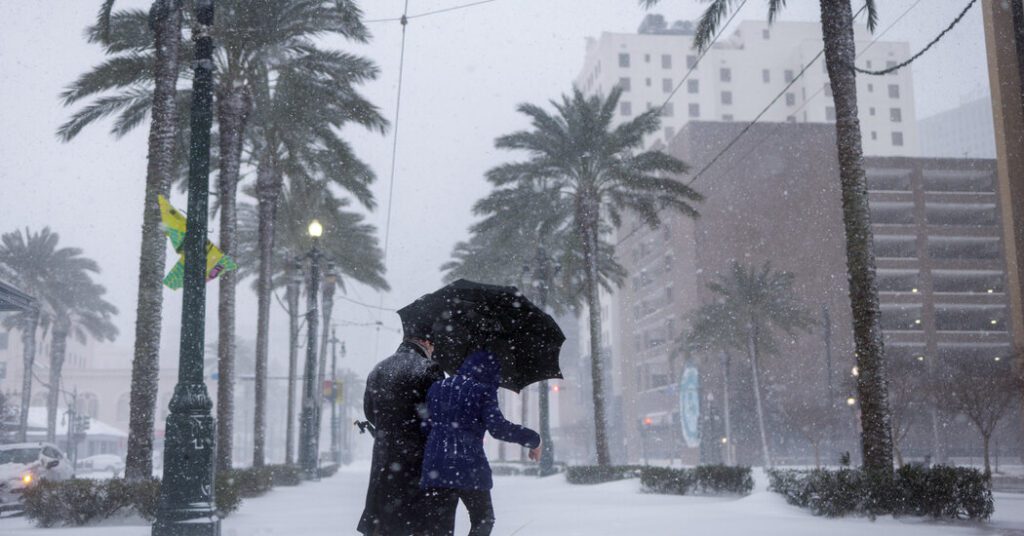After a rare winter storm that battered the southern United States with record snowfall, the region faced a dangerous new threat Thursday morning. That's ice on roads that may not completely melt in some areas until the weekend.
Authorities across much of the South, from the swamps of Louisiana to the coasts of the Carolinas, are sending a similar message. They told residents the effects of the storm are not over yet and driving on untreated roads that remain frozen with slippery ice remains dangerous.
Temperatures briefly rose above freezing in parts of Louisiana, southern Alabama, and Mississippi, but nighttime temperatures plummeted in areas such as Georgia, northern Florida, and coastal areas of the Carolinas, causing road damage. Snow and ice refrozen. Morning commuters faced an increased risk of black ice, a slippery patch that forms unexpectedly and almost invisibly to blend into the asphalt.
“Ice is ice, and it poses a danger to motorists if they're not prepared,” said Richard Bunn, a meteorologist with the National Weather Service.
The threat is even worse in areas that are not used to severe cold and don't have a regular and well-stocked supply of snowplows. Temperatures could drop as low as 12 degrees Fahrenheit in parts of southern Mississippi, Alabama, Georgia and the Florida Panhandle Thursday morning, according to the National Weather Service, which issued an extreme cold warning for the region into the morning. did.
The storm has already caused chaos in the region, with many schools canceling classes this week and airports experiencing flight delays and cancellations, making travel nearly impossible. By Thursday morning, hundreds of flights had been canceled and several airports in the southeast had suspended operations.
South Carolina's Charleston International Airport was closed Wednesday due to ice and snow, and it was unclear early Thursday when it would reopen. At New Orleans International Airport, all flights departing before noon Thursday were canceled, although airlines had planned to resume service in the afternoon.
Tallahassee International Airport in Florida and local and international airports in Mobile, Alabama were scheduled to resume operations Thursday afternoon.
The storm, caused by a mass of arctic air, also killed at least 10 people in Texas, Alabama and Georgia.
And cities received record amounts of snow. Mobile reported 7.5 inches. Pensacola, Florida recorded 7.6 inches, breaking the 1895 record of 3 inches. New Orleans recorded 8 inches, exceeding what Anchorage saw this month.
In Georgia, the State Patrol has responded to more than 3,000 calls since Tuesday night, including 370 vehicle crashes, the agency said in a statement.
As much as 6 inches of snow fell on North Carolina's eastern coast, and the state Department of Transportation deployed more than 1,300 trucks to clear roads.
“It's important to remember that we will continue to have subfreezing temperatures for the next several days, even though melted snow will refreeze each night,” said Will Ray, director of the state's Office of Emergency Management.
Several officials and power companies called on residents to help save electricity.
“We are not out of the woods yet,” South Alabama power company Baldwin EMC said in a social media post.
In the Alabama coastal port city of Mobile, many roads were deemed impassable, and residents' initial glee at the snow turned into anxiety about travel.
“The snow was beautiful and fun, but there can be a lot of problems hidden beneath the snow and ice,” Baldwin County Public Schools Superintendent Eddie Tyler said after schools were closed. , wrote in a letter to parents: The rest of this week.
In Tallahassee, Florida, police officers used pepper balls to break up a violent snowball fight. The Tallahassee Police Department confirmed in a statement that officers arrived at the scene of the winter disturbance after a resident complained of being hit in the head by a snowball. Police acknowledged in a statement that they used the tactic after officers were punched in the face and the crowd refused to stop.
The Louisiana Department of Transportation announced that a portion of Interstate 10 between the Texas border and Lake Charles would open Wednesday night, but much of the highway remained closed in both directions Thursday morning. Ta.
Georgia State Patrol said it responded to more than 100 vehicle accidents. More than 100 vehicles were stuck on icy roads in DeKalb County, Georgia, “impeding emergency response efforts,” authorities said.
Officials said subzero temperatures have slowed road clearing efforts. Several fire engines were also stranded.
“This is a serious situation,” said County Executive Lorraine Cochran-Johnson. “We ask for your patience and cooperation as our teams work around the clock to ensure public safety.”
Ali Watkins and Ceylan Yeins Contributed to the report.

